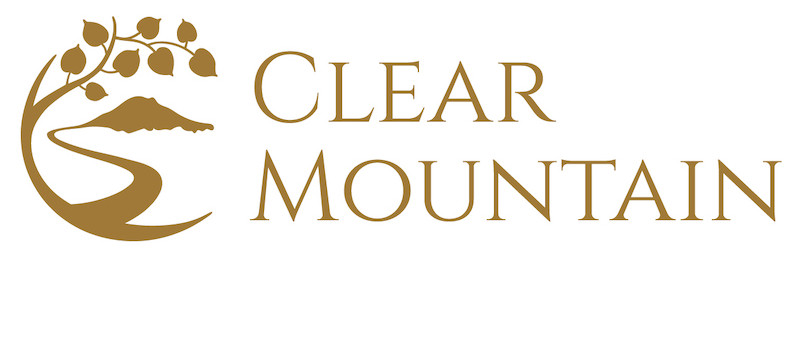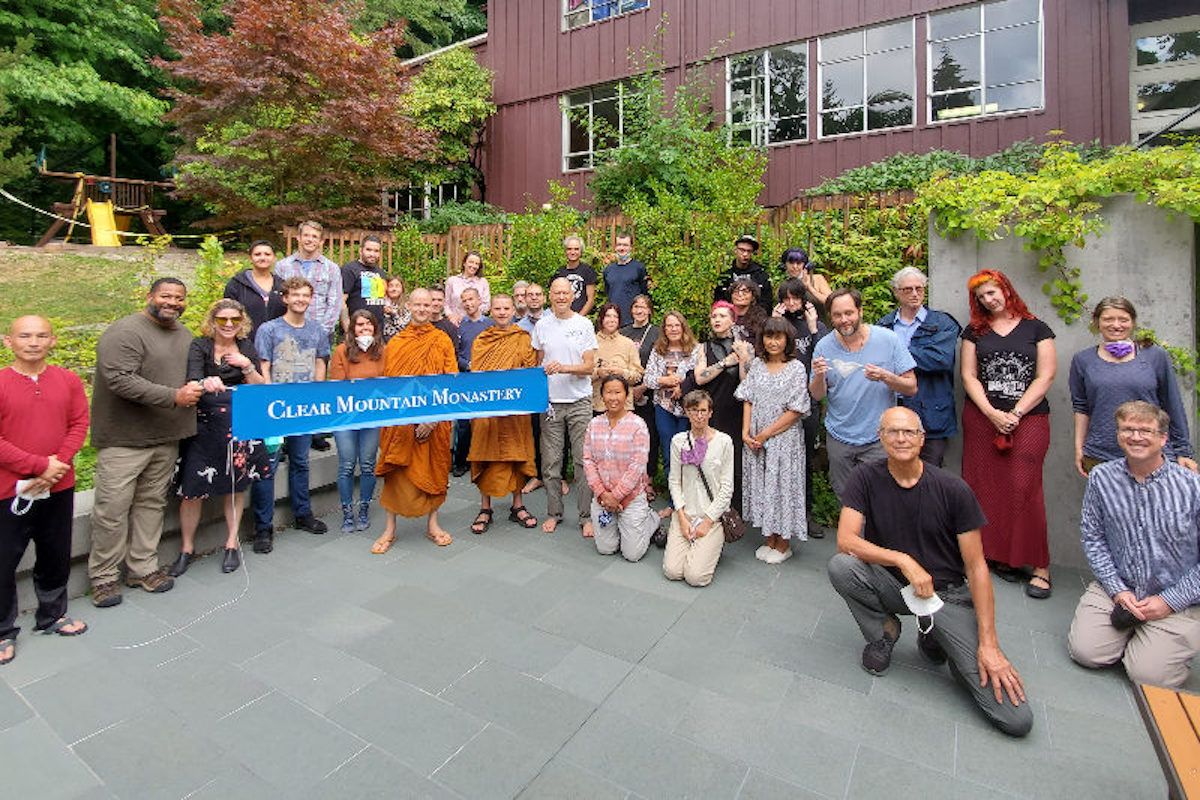I arrived in Seattle in late June and took up residence in a small hut behind the house of a couple, Dave and Alison, who offered the space to me in an act of great generosity. Their home rests in a quiet suburb on the Kitsap peninsula, a short ferry ride across the Puget Sound from Seattle. Southworth represents an unexpected oasis of quiet for being only twenty minutes from the city’s heat; the cool shadows of fir that line its roads seem sweet in the August heat as the blackberries below them, and the occasional rusted car in the tall grass or Bob Dylan tune wafting from a neighbor’s home attests to a disdain for the era. All in all, it’s a good place for a monk.
Every weekday morning, I leave the hut at 6 am and walk ten minutes along the quiet road to the Southworth Fast Ferry, meditating during its twenty-minute crossing to Colman Dock downtown. Walking from the waterfront to Pike Place, where I stand for alms every weekday, I pass by the city’s ghosts. On the side of First, a man taps out a line of coke on a small shaving mirror while several blocks away another wraps himself in a half-embrace as he stumbles down the sidewalk muttering. “It’s the crystal that makes them talk,” someone standing next to me frowns. To see the flawless glass of Seattle’s mirage fracturing would have depressed me before I found the Dhamma’s earthy realism, and I regularly recite Buddhist scripture as I walk: “And what, bhikkhus, is the fragile? Form is fragile. Feeling is fragile. Perception is fragile. Mental formations are fragile. Consciousness is fragile. And what is the un-fragile? The change, fading, and cessation of that very form… feeling… perception… mental formations… consciousness.”
Yet going for alms also allows me to see peoples’ beauty on a daily basis. Every morning, I stand near the Pike Place Starbucks (which also happens to be the first Starbucks ever founded. “It’s like a pilgrimage!,” Luang Por Pasanno laughed when I told him). Customers or passersby ask what I’m doing or hold out a dollar. When I explain that I can’t accept money, they find other ways to give. One woman spontaneously handed me the coffee she’d just bought for herself. For weeks, a Vietnamese man visiting from California drove down to the market before work to offer flowers and stand nearby, watching to see if I received enough. Regularly, he walked several blocks through the entree-averse desert of bakeries that is Pike Place at 7 am to find a sandwich he could give. The depth of his faith was matched only by how quickly he gained it. Where he used to spend most nights out, a sudden upwelling of faith in a monastery one year ago spurred him to shift everything: he now meditates sometimes five or more times each day, before and after work, and keeps the eight precepts, not eating after noon. Some days feature four or five unexpected offerings; others the gift of whoever signed up on the meal calendar for that day.
Yet every day, without exception, has held at least one meaningful interaction. My first week, a young man named Quinten pressed his hands together in a clumsy “namaste”, and asked to get me some food while we spoke about faith. A devoted Christian, he talked about trying to keep prayer central in his life while everyone around him seemed to only care about getting the newer thing or lamenting the world’s tragedies. “I don’t worry so much,” he gazed towards the oceanfront, “I just pray, and as long as I walk straight, I trust that God will provide.”
The Christians I have met this summer embody a powerful generosity. Within the past month, three churches have freely offered us space in which to gather, opening their sanctuaries to a completely different tradition. Fauntleroy Church in West Seattle allowed us to hold our first day-long retreat in their sanctuary. When I attended a sermon there to honor the relationship, Reverend Leah, the pastor, spoke about Christ multiplying fish and loaves of bread, a story repeated more often in the New Testament than even the resurrection. Scarcity, she reflected, is the mindset of the unenlightened, and we must regularly “look to the feast” in order to remember what abundance surrounds us and gifts we might offer.
The past month has represented just such a feast, with small gifts and new friendships manifesting even in the city’s most remote corners. In mid-July, I visited All Merciful Saviour Monastery, a Russian Orthodox community on Vashon island. Abbot Tryphon received me in an office filled with gifts and pictures from his forty-odd years in robes, including a replica of Gandalf’s staff, sword, and pipe gifted by parishioners who noticed the resemblance. For three hours, we talked about the robes and his path from clinical psychology and Zen to the church. When he told me about the saints he knew of who still lived on Mount Athos, a peninsula in Northern Greece that serves as the home to over twenty monasteries, his eyes filled with tears. Russian Orthodox monks attempt to follow the Bible’s injunction to “pray without ceasing”, reciting continuously until the mind and heart become unified in what Buddhists would term samadhi, or concentration. Before driving me the twenty-minutes back to the ferry, he handed me several bars of their tie-dye “Peggy’s Peacock Swirl” monastery soap as a gift. “A woman named Peggy who was a little crazy used to visit,” he smiled as he opened his door to get in the driver’s seat.
Saint Mark’s Episcopal cathedral opened its doors to our group, agreeing to host our Saturday morning gatherings on their premises. In return, they asked only that some of their congregation be allowed to come learn meditative techniques as a basis for centering prayer. In an era of unrest, the opportunity for religious traditions to support one another seems more important than ever. Our growing community will begin meeting in the cathedral’s Carriage House most Saturdays, gathering to sit in the main sanctuary once every month. After offering the space to us, the Pastor Reverend Thomason handed the man accompanying me a donation for Clear Mountain. “I think we need projects like this for the center to hold,” he remarked as he passed along a granola bar as well.
I take heart when society rises to support a beautiful aspiration, but must remind myself that the worldly winds spoken of by the Buddha always blow both ways. Gain is followed by loss, pleasure by pain, fame by disrepute, praise by blame. “When you see someone well-off…” the Buddha cautions in the Connected Discourses, “and when you see someone suffering… you should reflect, ‘We too have experienced just this sort of thing in the course of that long, long time.’ Why is that? From an inconstruable beginning comes transmigration. A beginning point is not evident, though beings hindered by ignorance and fettered by craving are transmigrating and wandering on. Long have you thus experienced stress, experienced pain, experienced loss, swelling the cemeteries – enough to become disenchanted with all fabricated things, enough to become dispassionate, enough to be released.”
The duty of a practitioner is to continually learn from the experience, applying the Four Noble Truths’ framework until all craving is abandoned. Or, as Ajahn Jayasaro put it in Ajahn Kovilo and my recent interview with him, to continue seeing ourselves as no more than articulate earthworms, fertilizing soil in the most humble of ways.
Seattle’s August mornings reveal a sun rare to the coast, and its slow climb bands the horizon with ten shades of gold. The faces of the city’s skyscrapers remain inscrutable, yet, if I walk off the ferry at just the right moment, I can see the dawn reflecting off one darkly-mirrored column to the next like a dove searching for firm ground on which to land.


